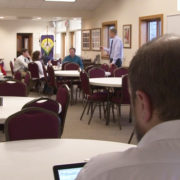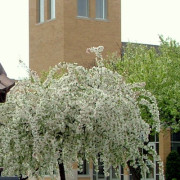God’s outlaw
Mark G. Schroeder
Every time we open an English Bible—regardless of what translation we may choose—we do so owing a debt of gratitude to a man who was known as “God’s outlaw.” As Luther did for German-speaking people, this man translated the Bible from the original Greek and Hebrew into English. And what is amazing is that most of us do not even know his name.
The man who would later become known as “God’s outlaw” was William Tyndale (1494–1536). Tyndale was a scholar and theologian who became one of the leading figures in the Reformation in England. At a time when the only English translations of the Bible were incomplete and based on the Latin Vulgate, Tyndale, like Luther, saw the need for the Bible to be available in the language of the people. He traveled from his home to London in 1523, hoping to secure permission to undertake his translation, but permission was denied.
The next year, Tyndale left England and headed for Germany. Arriving in Wittenberg, he enrolled at the University of Wittenberg and studied under Lutheran teachers and theologians. Only two years earlier, Luther had begun to translate the New Testament into German while at the Wartburg Castle, completing it in 1522. Inspired by Luther and following his example, Tyndale completed his translation of the New Testament in 1526.
Tyndale’s accomplishment, while easily overlooked, should never be forgotten. His translation became the basis for several other English translations that followed. Most notably, the 54 scholars who produced the King James Version in 1611 depended heavily on the work that Tyndale had done. Fully 80 percent of the King James New Testament books and 75 percent of the Old Testament books translated by Tyndale reproduced Tyndale’s words exactly.
Rather than being recognized as a hero or saint, Tyndale’s efforts earned him a very different reaction at the time. His translation was viewed as a challenge to the authority and power of the church. Copies of the translation were smuggled from Germany and Belgium into England. There the Bishop Turnstall threatened booksellers with severe punishment for selling the Bibles, and piles of the Tyndale translation were publicly burned. Cardinal Wolsey declared Tyndale to be a heretic. In 1530, when Tyndale declared that King Henry VIII’s planned divorce was unscriptural, the king asked the Holy Roman Emperor to have Tyndale arrested and extradited to England.
Tyndale never made it back to England. He was arrested and imprisoned in Belgium in 1535. After a year in a dark dungeon, he was condemned as a heretic. He was tied to a stake and strangled; his lifeless body was then burned. “God’s outlaw” gave his life for the sake of the gospel and because of his desire to put the Word of God into the hands of ordinary people.
Before he died, Tyndale’s last words were a prayer: “Lord, open the King of England’s eyes!” God granted that prayer. Within four years, the King of England commissioned four new English translations, all of them based on Tyndale’s translation. And in 1611, the version authorized by King James would use Tyndale’s work as the basis of a translation that would be used for the next five centuries.
William Tyndale will probably never be a name that most English-speaking Christians will remember. But we should remember what he did. And we should thank God for this man who made the ultimate sacrifice to bring the Word of God to generations of people.
SUBMIT YOUR STORY
Do you have a manuscript, idea, or story from your own life you’d like to share for use in Forward in Christ or on wels.net? Use our online form to share it to our editorial office for consideration.
SUBSCRIBE TO FORWARD IN CHRIST
Get inspirational stories, spiritual help, and synod news from Forward in Christ every month. Print and digital subscriptions are available from Northwestern Publishing House.
Author: Mark G. Schroeder
Volume 103, Number 6
Issue: June 2016
Copyrighted by WELS Forward in Christ © 2021
Forward in Christ grants permission for any original article (not a reprint) to be printed for use in a WELS church, school, or organization, provided that it is distributed free and indicate Forward in Christ as the source. Images may not be reproduced except in the context of its article. Contact us




